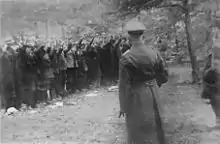Wielka Piaśnica
Wielka Piaśnica [ˈvjɛlka pjaɕˈnit͡sa] is a village in the administrative district of Gmina Puck, within Puck County, Pomeranian Voivodeship, in northern Poland.[1] It lies approximately 14 kilometres (9 mi) west of Puck and 46 km (29 mi) north-west of the regional capital Gdańsk.
Wielka Piaśnica | |
|---|---|
Village | |
_2011.jpg.webp) Memorial outside the village during celebrations | |
 Wielka Piaśnica | |
| Coordinates: 54°40′56″N 18°11′43″E | |
| Country | |
| Voivodeship | Pomeranian |
| County | Puck |
| Gmina | Gmina Puck |
| Population | 64 |
World War II

After the 1939 Invasion of Poland, German SS from Danzig (Gdańsk) and local German Selbstschutz members executed about 12,000 civilians,[2] mainly Polish and Kashubian intelligentsia from the Pomeranian Voivodeship, in the Darżlubska forest next to the village. Among the victims were approximately 1,200 mentally ill persons from local hospitals,[3] killed in the course of the forced euthanasia policy dubbed Action T4.
The mass executions began in October 1939 and lasted until April 1940. An exhumation of mass graves was carried after World War II in 1946. Out of total number of 35 graves, 30 were localised of which 26 were exhumed. Only 305 bodies (in two mass graves) were found, the rest of the bodies were burnt by Germans in August–September 1944. Sonderkommandos (forced prison labourers) from Stutthof concentration camp were used to cover up the tracks and were later executed.[4]
See also
References
- "Central Statistical Office (GUS) - TERYT (National Register of Territorial Land Apportionment Journal)" (in Polish). 2008-06-01.
- Cherry, Robert D.; Orla-Bukowska, Annamaria (2007), Rethinking Poles and Jews: troubled past, brighter future, Lanham MD: Rowman & Littlefield, p. 100, ISBN 978-0-7425-4666-0, retrieved 23 December 2010
- Barbara Bojarska (2001). Piaśnica - miejsce martyrologii i pamięci: z badań nad zbrodniami hitlerowskimi na Pomorzu (in Polish). Wejherowo. ISBN 978-83-914705-0-3.
{{cite book}}: CS1 maint: location missing publisher (link) - Response of Polish Minister of Defence to parliamentary interpellation #1333 17 March 2006
